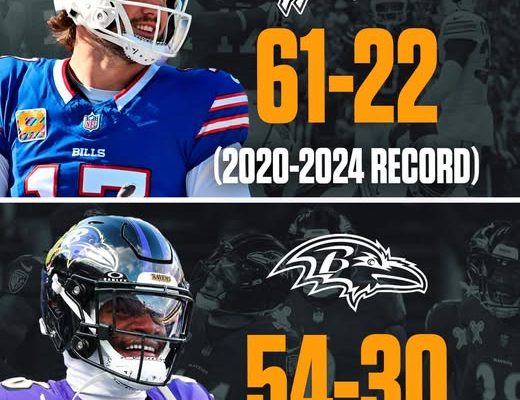░S░H░O░C░K░W░A░V░E░S░ ░H░I░T░ ░T░H░E░ ░P░L░A░I░N░S░:░ Despite MVP QBs and Dominant Rosters, the 2020–2024 Ravens and Bills Delivered the Biggest Disappointments of the Decade
From 2020 to 2024, two franchises repeatedly stood on the doorstep of greatness, armed with MVP-caliber quarterbacks, elite defenses, explosive playmakers, and Super Bowl-level expectations. The Baltimore Ravens and Buffalo Bills were not just good—they were dominant on paper. They entered season after season with hype, national praise, and rosters built to win it all. But instead of glory, they delivered heartbreak. Instead of legacy-defining moments, they left their fanbases with one burning question: what went wrong?
These weren’t just playoff-caliber teams—they were Super Bowl favorites. And yet, neither the Ravens nor the Bills could finish the job. For all the talent, all the buzz, and all the belief, the past five seasons ended in frustration, near-misses, and collapse. Now, as 2025 begins and the next NFL chapter unfolds, the football world is still trying to make sense of how two powerhouse organizations could produce some of the most disappointing postseason records in recent memory.
It all starts with the quarterbacks—Josh Allen and Lamar Jackson—two players whose individual brilliance reshaped the league.
Josh Allen, drafted in 2018, rose from a raw prospect to one of the most feared dual-threat quarterbacks in the NFL. By 2020, he was an MVP runner-up and the Bills were considered AFC royalty. Armed with a cannon arm, unmatched athleticism, and a fearless playing style, Allen led the Bills to four straight playoff appearances between 2020 and 2023. And yet, in each of those seasons, the team fell short. Whether it was a defensive meltdown in the infamous “13 Seconds” game against the Chiefs in 2021 or the sluggish offensive performance in the 2022 Divisional Round, Buffalo could never quite break through.
On the other side stood Lamar Jackson, the Ravens’ 2019 MVP. Jackson’s unique skill set—blazing speed, sharp vision, and the ability to turn broken plays into magic—made Baltimore one of the most dangerous teams in the league. Under Head Coach John Harbaugh, the Ravens were innovative, physical, and relentless. From 2020 to 2024, they built championship-worthy rosters multiple times: elite secondaries, Pro Bowl-caliber offensive linemen, dynamic run games. Yet somehow, just like the Bills, they never reached the big game.
Despite winning records, playoff berths, and flashes of dominance, both franchises developed a pattern—impressive regular seasons, only to falter when the stakes were highest. These weren’t mild failures; they were gut-wrenching. The Bills had their best chance in 2020 and 2021, while the Ravens surged in 2023 and 2024. And each time, something slipped: a missed assignment, a poorly timed turnover, a coaching misfire, or simply being outplayed by a more composed opponent.
For the Bills, their playoff runs were marked by inconsistency. One week, they would blow out elite teams. The next, they would sputter against inferior opponents. The 2020 season ended in the AFC Championship with a tough loss to Kansas City. In 2021, it was the aforementioned “13 Seconds” collapse—a game where they had victory in hand before Patrick Mahomes orchestrated a miracle. 2022 and 2023 brought more exits in the Divisional Round, with questions swirling around their ability to adapt under pressure. By 2024, the once-promising Super Bowl window was no longer wide open—it was cracking.
Baltimore, meanwhile, endured a different kind of frustration. Injuries plagued their best teams. In 2021 and 2022, the Ravens were devastated by health issues at key positions. By the time the 2023 season arrived, things looked different. Jackson was healthy, the defense was top-five, and the offense had added young weapons like Zay Flowers. They bulldozed through the regular season and looked like legitimate contenders. But then came the playoffs. One loss at home, another blown lead, another offseason of “what ifs.”
Coaching also came under the microscope. For Buffalo, Sean McDermott has been both praised and criticized. While he brought the Bills back to relevance, critics argue he failed to evolve as a tactician in high-stakes games. The Bills’ playoff game plans often looked conservative, predictable, and reactionary. The inability to get over the Chiefs hump haunted them repeatedly, as did their overreliance on Allen to be a one-man offense.
John Harbaugh’s situation in Baltimore mirrors McDermott’s. A respected, Super Bowl-winning coach, Harbaugh reinvented the Ravens around Jackson. But postseason adjustments—or lack thereof—have repeatedly sunk his team. From questionable fourth-down calls to conservative second-half play-calling, Harbaugh’s decisions often looked cautious at the wrong time. The 2023 and 2024 campaigns in particular brought fierce scrutiny, as both seasons ended in losses that many believed were avoidable.
And then there’s the psychological weight. Both teams bore the pressure of expectation every year. The Bills carried the burden of a franchise that had never won a Super Bowl, a city desperate for triumph after four straight Super Bowl losses in the 90s. The Ravens, a franchise with championship DNA, expected more from the Jackson era—more deep playoff runs, more statement wins, more rings. When you stack season after season of failure on top of each other, it becomes more than just bad luck. It becomes identity. The Bills and Ravens, despite their elite talent, became known for being “almost” teams.
The ripple effects have been significant. Fanbases have grown restless. The narratives have changed. Once hailed as the future of the league, both teams are now viewed through the lens of wasted potential. And as new powerhouses rise—like the resurgent Texans under C.J. Stroud or the Chiefs’ continuing dynasty—the question looms: have the Bills and Ravens already peaked?
Even the quarterbacks, once media darlings, now face more criticism. Josh Allen’s turnover issues in key games, Lamar Jackson’s struggles in big moments—fair or not, those labels stick. And while both players are still elite, they’re no longer protected by youth or novelty. The league is asking: Can they deliver when it matters most?
Of course, the story isn’t over. Both teams still have championship-caliber talent. The Bills have made roster adjustments, bolstering their offensive line and investing in youth on defense. The Ravens are banking on continuity, health, and Jackson’s evolution as a complete passer. But make no mistake—the clock is ticking. These next two seasons will likely determine the legacy of this era.
There’s still time for redemption. The NFL has seen great teams struggle before finally breaking through. Peyton Manning needed years to win his first. Drew Brees had to wait. Even the great John Elway lost three Super Bowls before finally winning two. For the Ravens and Bills, the window hasn’t slammed shut—but it’s no longer wide open either.
The 2025 season is shaping up as a make-or-break year. Both teams will enter with something to prove—not just to the league, but to themselves. No more moral victories. No more “almost.” Just results. Just rings.
And maybe that’s what both franchises need—a return to basics. Less hype, more hunger. Less talk, more grit. Because no stat, no projection, no preseason ranking can erase the feeling of watching your team crumble under the lights again and again.
For now, the Ravens and Bills remain two of the most compelling case studies in the NFL: proof that talent alone isn’t enough, that greatness is about more than potential. It’s about seizing the moment. And between 2020 and 2024, that moment came and went too many times.
So as shockwaves continue to hit the Plains—both literal and metaphorical—the NFL world watches with equal parts curiosity and skepticism. Can Buffalo finally get out of its own way? Can Baltimore shake the weight of postseason ghosts? Or will they remain the tragic giants of a decade that once promised so much?
One thing is certain: the margin for error is gone. The excuses are done. The next chapter has to be different. Because if it’s not—if these teams fall short again—then this era of the Ravens and Bills will be remembered not for what they did, but for everything they couldn’t quite finish.



